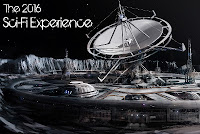The Calcutta Chromosome by Amitav Ghosh
Published: Avon, 1995
Awards Won: Arthur C. Clarke Award
The Book:
“This story of malaria, fever, delirium and discovery stretches across time and space—from Ronald Ross’s malaria research in Victorian India, to the obsessed Murugan’s study of Ross’s life in 1995 Calcutta, to Antar’s investigation into the disappearance of his acquaintance Murugan in near-future New York. The cord that binds them all together may involve a shadowy conspiracy, which makes use of malaria’s ability to affect the brain to achieve a kind of immortality.” ~Allie
This is the first novel I’ve read by Amitav Ghosh, and it was also my next commute audio book. It’s my second review for Stainless Steel Droppings’ Sci-Fi Experience.
My Thoughts:
This was a very confusing novel for me, and while I was trying to process it I came across this interesting analysis by Prof. Shubha Tiwari. For anyone who is interested in an examination of the ideas and thematic goals of the novel, I would recommend taking a look. After reading that article, though, I feel like I just didn't have an understanding of Indian culture, mythology and history that was sufficient to fully appreciate what Ghosh was doing. This is not a novel that leads the reader by the hand, so others like me might want to be prepared to do some outside supplemental reading. On the other hand, I did enjoy the opportunity to learn a bit more about India, both in the novel itself and in my internet reading afterward. The setting of Calcutta in 1995 was especially vivid and unfamiliar to me, so the bits of usual daily life were just as intriguing as the more unusual or confusing elements.
In addition to the unfamiliar cultural setting, there’s an awful lot going on. The story intertwines a fictional version of Ronald Ross’s malaria research, a ‘present’ story in 1995 Calcutta, a near-future story, and various one-off side stories. The strongest thread is the ‘present’ one, which includes not only Murugan but also two Indian women—Sonali, a celebrity and former actress, and Urmila, an ambitious reporter. I enjoyed reading about these characters, but I felt like the plot was a little overly dominated by uncovering and explaining information in dialogue. Quite a lot of Ross’s story, as well as other historical tales and theories about the shadowy organization and their goals, are directly told by Murugan to whichever character he is around at the moment. Listening to this in audiobook form, it felt especially noticeable that a lot of the story involved Murugan spouting information at people. There was a lot of discussion about influencing reality through the careful control of information, so I suspect this may have been a deliberate narrative choice.
With all of this, there are a lot of ideas and bits of plot floating around, which did not all seem to gel at the end of the novel. It’s entirely possible I missed some metaphorical meanings or subtle connections, and that I will just need to read this again one day to try and work them out. However, on this read through it felt like a lot of things were introduced that did not lead much of anywhere. For instance, there were side stories about spiritualists, an epidemic, and a ghostly encounter at a train station, all of which seemed only very loosely connected to the main story. For that matter, assuming the main story involves the shadowy organization that is searching for the “Calcutta Chromosome”, the entire novel is set at something of a distance. I vaguely understand some of the organization’s goals, but we only ever see these people through the lenses of other peoples’ stories. In the end, The Calcutta Chromosome felt like something of a puzzle, but one that I could not quite manage to solve.
My Rating: 3/5
I felt like The Calcutta Chromosome was a challenging novel, and one which I think I ultimately did not fully understand. Despite this, it was fun to read a science fiction novel based in India, and it was probably a good experience to read so far out of my reading comfort zone. I enjoyed reading about Calcutta in 1995 and the characters who lived there. At the same time, I felt like too much of the story was tied up in the transfer of information through dialogue, and I was disappointed by how little closure there was in the end for the many different topics brought up through the course of the novel. I found reading this novel to be both and interesting and a frustrating experience.


No comments:
Post a Comment